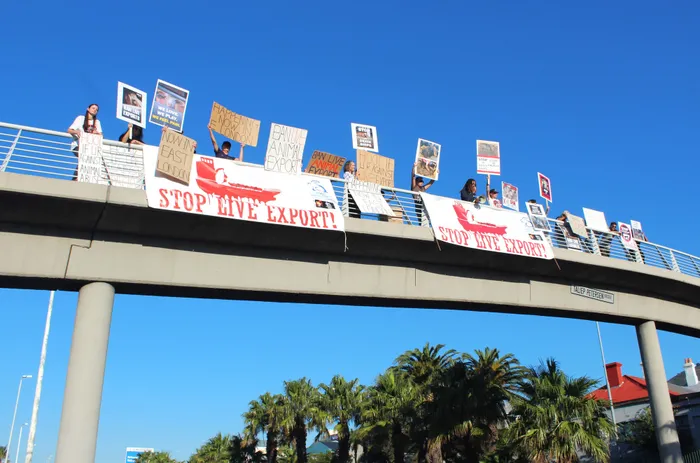FOUR PAWS calls for an urgent ban on live animal exports by sea in South Africa

Animal-rights activists protest from a freeway bridge in Woodstock against livestock exports.
Image: File
Global animal organisation, FOUR PAWS has called on South Africa to ban live animal exports by sea.
The organisation said despite indisputable evidence of extreme cruelty, global momentum to end this trade, and mounting public opposition, the government has shown no intention to act accordingly.
Director of FOUR PAWS South Africa, Fiona Miles, said this practice is not only outdated and inhumane but it is also economically flawed and a threat to public and animal health. She said the time has come for South Africa to take a stand.
“Animals are suffering. The public is watching. The world is changing. We urge our government to show the leadership and compassion our laws and values demand,” Miles said.
The case against live exports by sea
The suffering endured by animals exported by sea is harrowing and well-documented:
- Weeks or months of travel, enduring unbearable heat stress, high stocking densities, starvation, seasickness, dehydration, and poor ventilation.
- Cramped and filthy conditions, with many animals dying during transit.
- Survivors often face cruel slaughter methods at their destinations.
- The Department of Agriculture’s (DOA) guidelines for the Exportation of Live Animals by Sea are non-binding, and even binding regulations cannot be enforceable once the animals leave national borders, leaving animals vulnerable to cruelty at sea and in the destination country.
- South Africa’s courts have recognised that animals are sentient beings and that the government has an obligation to consider their welfare.
Countries that have set a precedent
- New Zealand banned live exports by sea in 2022.
- Australia has passed legislation to end live sheep exports by 2028.
- The United Kingdom banned live exports for slaughter in 2024.
The organisation said South Africa has the capacity to do the same, it only lacks the political will.
It said the economic argument falls apart as chilled meat exports and local slaughter generate more jobs, higher GDP returns, and boost rural development. It further stated that humane alternatives are not only possible, but they’re also profitable.
Transporting live animals over long distances increases the risk of zoonotic disease outbreaks, threatening both human and animal populations.
“The Covid-19 pandemic has shown how urgent it is to mitigate such risks,” it said
“FOUR PAWS urges the DOA to: prohibit live exports by sea, promote humane alternatives, and fulfil its constitutional, legal and ethical duty to protect animals. Let South Africa be a global leader in compassionate trade as the world marks Ban Live Exports International Awareness Day on June 14,” Miles said.
She has urged South Africa to lead with compassion, not cruelty.
“The evidence is overwhelming. The alternatives are ready. The moral obligation is clear. South Africa must ban live animal exports by sea, now,” Miles added.
robin.francke@iol.co.za
IOL
Related Topics:
